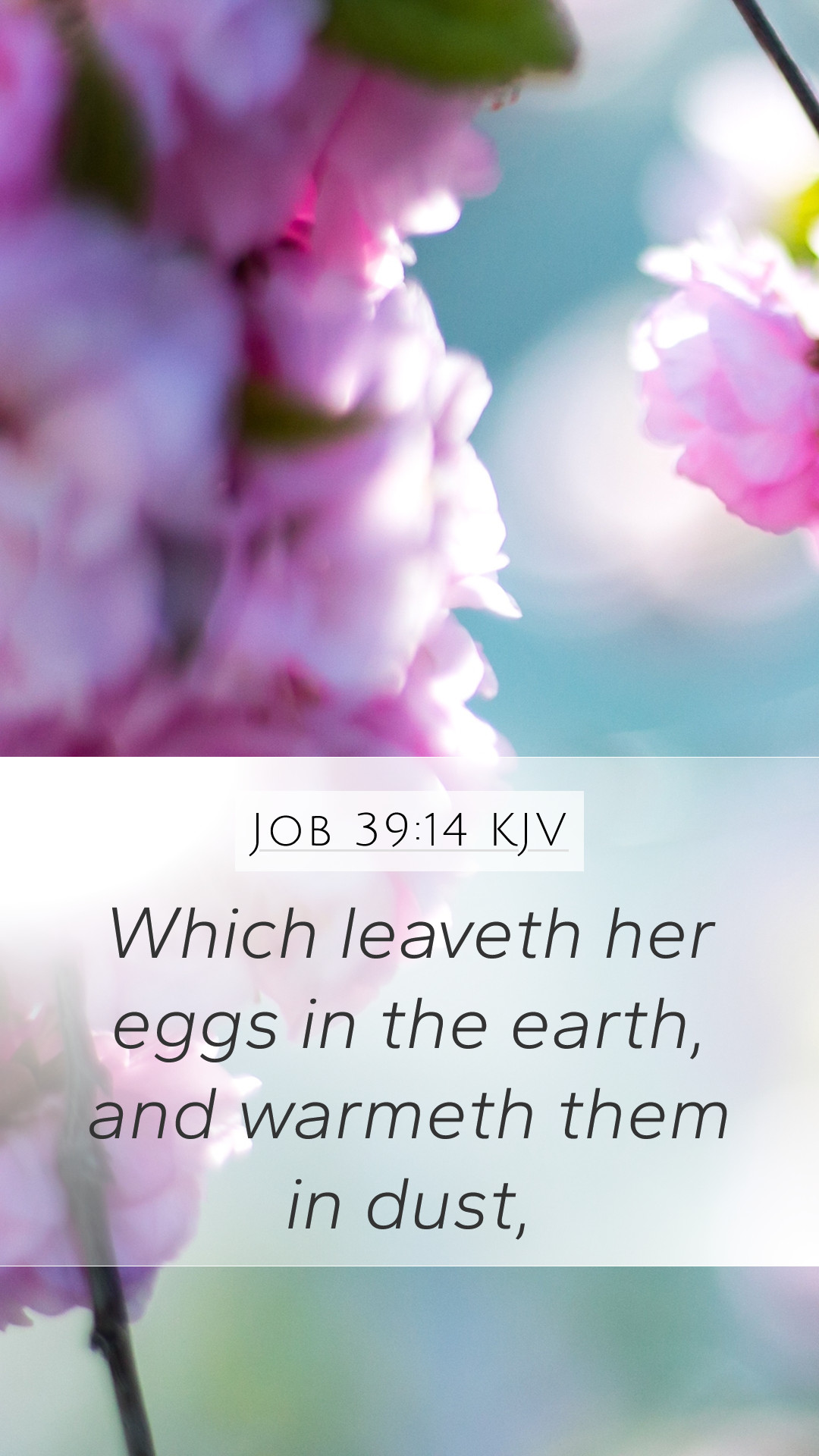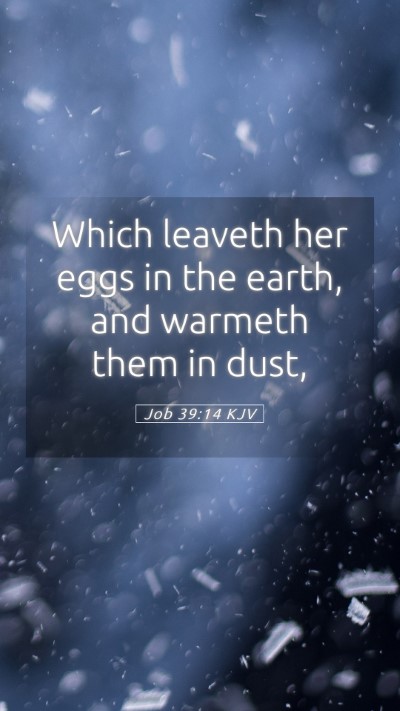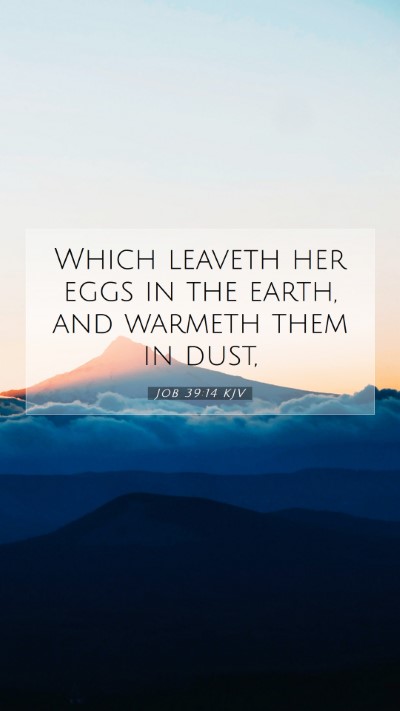Old Testament
Genesis Exodus Leviticus Numbers Deuteronomy Joshua Judges Ruth 1 Samuel 2 Samuel 1 Kings 2 Kings 1 Chronicles 2 Chronicles Ezra Nehemiah Esther Job Psalms Proverbs Ecclesiastes Song of Solomon Isaiah Jeremiah Lamentations Ezekiel Daniel Hosea Joel Amos Obadiah Jonah Micah Nahum Habakkuk Zephaniah Haggai Zechariah MalachiJob 39:14 Meaning
What is the meaning of Job 39:14?
Which leaveth her eggs in the earth, and warmeth them in dust,
Job 39:14 Bible Verse Meaning
Understanding Job 39:14 - Bible Verse Commentary
Verse: Job 39:14 - "For she leaveth her eggs in the earth, and warmeth them in the dust."
This verse provides a vivid depiction of the behavior of the ostrich, illustrating a broader theme found in the Book of Job regarding God's creation and the role of its creatures. The analysis of this verse combines insights from various public domain commentaries, including those by Matthew Henry, Albert Barnes, and Adam Clarke, to delve deeper into its meaning and implications.
Meaning of Job 39:14
The verse speaks of the ostrich, a creature known for its peculiar nesting habits. Here, we see the ostrich laying her eggs in the ground and leaving them to incubate in the warmth of the earth. This behavior reflects the natural instinct of this bird, which serves as a metaphor for broader spiritual and philosophical themes.
Insights from Commentaries
-
Matthew Henry's Commentary:
Henry notes that the ostrich acts with a level of negligence towards her offspring, leaving them in the earth without care. This highlights a contrast with human beings, who bear a greater responsibility toward their young. Henry suggests this serves to demonstrate a principle about divine wisdom, showing that God's ways and creations are often beyond human understanding and care.
-
Albert Barnes' Exposition:
Barnes emphasizes the harshness of the ostrich's nesting behavior, indicating that while the bird is designed to survive in its environment, it lacks the nurturing quality commonly associated with other birds. He points out that this illustrates the idea that not all aspects of creation display the same care and nurturing ability, thus drawing attention to the Creator's manifold wisdom in how different creatures function in their roles.
-
Adam Clarke's Commentary:
Clarke elaborates on the ostrich’s characteristics and relates them to the broader themes in the Book of Job. He suggests that the ostrich, while neglectful, is part of God’s intricate design. Clarke intimates that the harsh realities portrayed in nature reflect the challenges and sufferings that Job himself experiences, underscoring the theme of enduring hardship without always recognizing God's providence.
Broader Themes in Job 39:14
Throughout the Book of Job, several themes emerge, including:
- The Sovereignty of God: The verse reflects on how God's control extends over all creation, including creatures that operate outside of human paradigms of care and nurturing.
- Human Understanding vs. Divine Wisdom: The behaviors of creatures, like the ostrich, serve to remind readers that human perspectives are limited when compared to divine wisdom.
- The Nature of Creation: The verse invites contemplation on the purpose and role of various creatures within the ecosystem and their reflection of divine qualities.
- Endurance in Trials: Just as the ostrich lays her eggs with a semblance of neglect, Job's suffering also exists within a greater plan, teaching lessons on patience and trust in God.
Application of Job 39:14
Applying the teachings of this verse can lead to several insights for personal reflection and understanding of life's challenges:
- Trusting God in Neglect: Just as the ostrich leaves its eggs in the safety of the earth, we should learn to trust God's oversight even in our most vulnerable moments.
- Recognizing Divine Purpose: Every aspect of creation, even those that do not seem nurturing, plays a role in the larger narrative of God's plan.
- Encouragement in Suffering: Job's experience, paralleled with the ostrich's journey, can provide solace to those enduring hardships, as it emphasizes a divine purpose that we may not fully comprehend.
Cross References
- Job 38:41: "Who provides for the raven its prey, when its young ones cry to God for help, and wander about for lack of food?"
- Isaiah 31:5: "Like birds hovering, so the LORD of hosts will protect Jerusalem; He will protect and deliver it; He will spare and rescue it."
- Psalms 104:27-28: "These all wait for thee, that thou mayest give them their meat in due season. That thou givest them they gather: thou openest thine hand, they are filled with good."
Conclusion
The exploration of Job 39:14 reveals profound truths about the complexities of creation and the nature of God's involvement in the world. Those seeking deeper bible verse explanations, bible verse interpretations, and bible study insights will find this verse a rich source of reflection. By examining the behaviors of even the most seemingly careless creatures, one can draw parallels to human experience and ultimately gain a greater appreciation for God's wisdom and the intricate balance of life.


